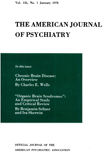A STUDY OF THE ANTIDEPRESSANT EFFECTS OF PARGYLINE
Abstract
The evaluation of antidepressant medication in an office practice setting is complicated by the somewhat unpredictable course of the illness, the long time interval before medications can become effective, and by the difficulty in weighing subjective findings. Our clinical impression, however, is that pargyline may demonstrate a low order of clinical effectiveness as an antidepressant agent. It would not appear to be as dependable or as effective as some of the other antidepressant medications which are available.
The low order of antidepressant effects may have some importance clinically in the use of pargyline as an anti-hypertensive drug since some other blood pressure reducing agents now in use in medical practice have a predilection for the production of depression. Further clinical study will be necessary to determine whether this inference holds. Importantly, physicians prescribing this medication for its antihypertensive effects should be aware of the fact that this is a monoamine oxidase inhibitor which must be prescribed with care. It should probably never be given along with other monoamine oxidase inhibitors or imipramine.
Access content
To read the fulltext, please use one of the options below to sign in or purchase access.- Personal login
- Institutional Login
- Sign in via OpenAthens
- Register for access
-
Please login/register if you wish to pair your device and check access availability.
Not a subscriber?
PsychiatryOnline subscription options offer access to the DSM-5 library, books, journals, CME, and patient resources. This all-in-one virtual library provides psychiatrists and mental health professionals with key resources for diagnosis, treatment, research, and professional development.
Need more help? PsychiatryOnline Customer Service may be reached by emailing [email protected] or by calling 800-368-5777 (in the U.S.) or 703-907-7322 (outside the U.S.).



